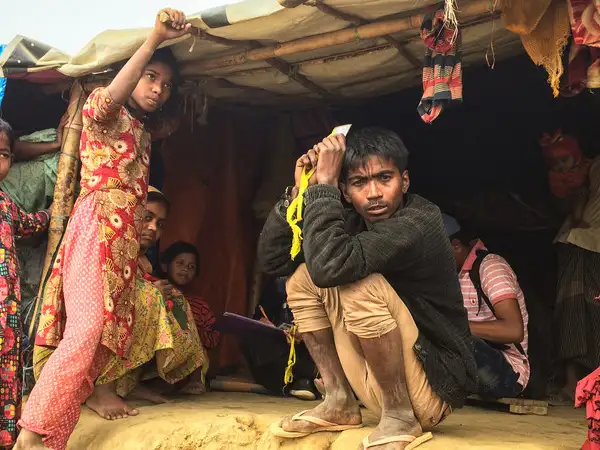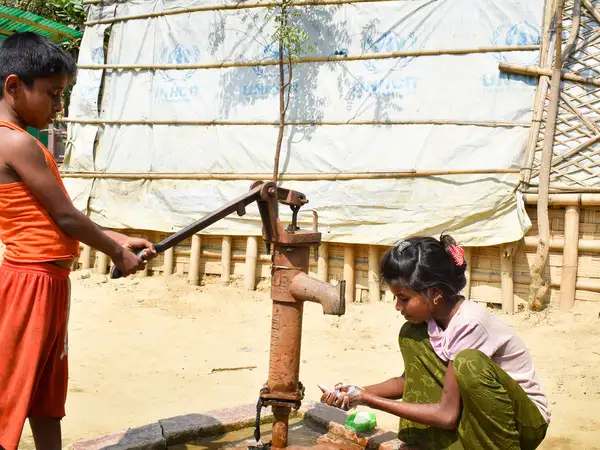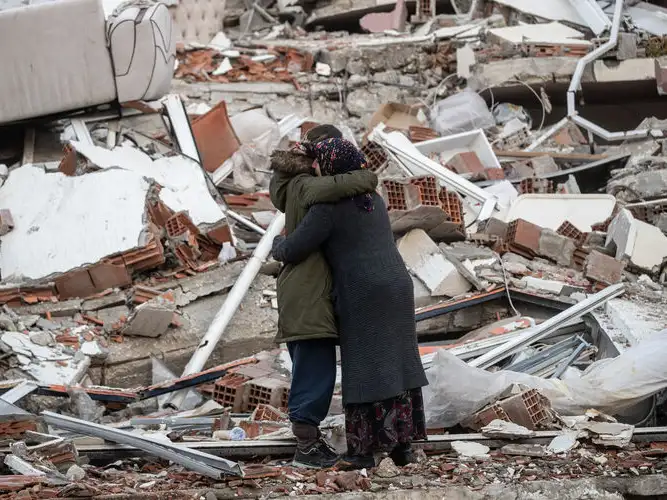

CAFOD have been rebuilding and improving shelters in the Rohingya refugee camp, but it is still very overcrowded, and social distancing is extremely hard.
Since 2017, over 700,000 Rohingya refugees have fled from Myanmar and now live in makeshift shelters in Cox's Bazar, Bangladesh. Most of these refugees – mainly women and children – continue to need emergency aid just to survive day to day.
We have been working with Rohingya refugees since the Bangladesh camp was established and our local experts and volunteers are already providing emergency food, clean water and health advice to vulnerable families.
Rohingya refugees living in Cox's Bazar were also affected by , which struck Bangladesh and India on 20 May 2020.
Why are Rohingya refugees so vulnerable to coronavirus?
The camps in Bangladesh could now become an even more dangerous home for the many refugees who live there and the prevention measures we have become used to in the UK will be almost impossible to practice.
Refugee families rely on help for basic daily living supplies, including clean water, soap, and washing powder, so regular handwashing and washing clothes is a challenge.
The camps are very overcrowded and shelters are makeshift, making social distancing advice impractical.
Limited food and healthcare mean also mean that some people are already unwell and will need extra help to survive the virus.
What is CAFOD doing to help Rohingya refugees in Bangladesh?
Our local experts have been providing practical help in Cox's Bazar since the camp was set up in 2017. We are continuing to work around the clock to ensure that the most vulnerable refugees in makeshift camps receive the aid they need.
So far, we have reached more than 360,000 Rohingya refugees with lifesaving help.
Together with Caritas Bangladesh - supported by dedicated teams of local aid workers and volunteers, with your generous donations we have
provided food, kitchen supplies and blankets to over 89,000 vulnerable families
installed 300 solar street lights, meaning women, children and the elderly can use water and toilet facilities at night
rebuilt temporary homes for 40,000 families, meaning they have somewhere to safer to shelter together
We were devastated to hear from local experts that a massive fire has swept through Rohingya Refugee camps, destroying thousands of shelters, health centres and other facilities. Caritas Bangladesh's work in the camps is ongoing, as they seek to support the victims of the fire.


A girl washes her hands with soap at a water pump in a refugee camp.
What about access to clean water and hand washing?
Volunteers are promoting hygiene in the camps - taking on a vital role that can help to prevent illness and save lives.
Alongside raising awareness throughout the community through this network of volunteers, your donations have also funded repairs to water pumps and clearing pathways to toilets and handwashing facilities.
Building female bathing areas, and installing solar street lights, also helps the many women and children living in the camps to maintain good hygiene. This is even more important now that coronavirus has reached the camps.
Who are the Rohingya?
The Rohingya are a predominantly Muslim ethnic group that has lived for centuries in Myanmar’s Rakhine region, making up roughly 2 per cent of the population.
What is the Catholic Church saying about the Rohingya Crisis?
The Catholic Church is urging all parties to this crisis to come together to seek a peaceful solution. They are also urging the international community to do all that they can in getting humanitarian aid to where it is needed most.
During his visit to Bangladesh at the end of November 2017, Pope Francis urged the international community to take “decisive measures” to resolve the causes of the mass exodus of Rohingya Muslims from Myanmar.
In a speech before Bangladesh’s President Abdul Hamid, government officials and ambassadors from around the world, Pope Francis praised Bangladesh’s sacrifice and generosity in welcoming in so many refugees “before the eyes of the whole world.”
Pope Francis also met with Rohingya refugees who were accompanied by our partner, Caritas Bangladesh.

Join us today with a monthly donation
Helping in emergencies needs all of us. Before, during and after a crisis, our local experts are working in their own communities to help families prepare, survive and rebuild.
With more emergencies than ever, there has never been a greater need for us to put our faith into action, together.
Please join us today with a monthly donation to our emergency response work. You can also sign up to receive prayer texts for when there is an emergency.

